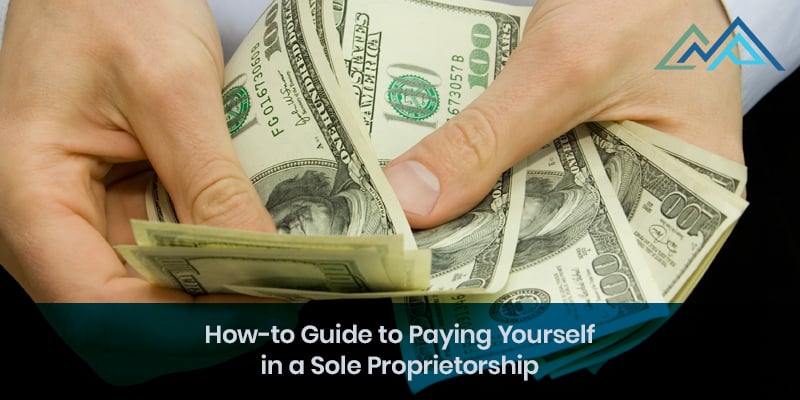For many people, working for themselves is the ideal situation. After all, self-employed people get to set their own hours and use their preferred methods to do things -- without answering to anybody but themselves.
That said, being a small business owner has its challenges. It's common for small business owners to underpay themselves and sacrifice their comfort to help the business to thrive.
At CMP, we understand the difficulties of being a sole proprietor because we work with people who are self-employed every day. One of the most common questions we get asked is:
How do I pay myself as a sole proprietor?
Sole proprietors need to know the best ways to pay themselves, so we've created this guide to help you. Continue reading to learn what you need to know.
What is a Sole Proprietorship?
A sole proprietorship is the simplest business structure and the most common. When a small business owner starts a business by themselves, it is an unincorporated business entity and there is no distinction between the owner and the business. That means you get all the profits, but you also shoulder all the responsibility, all the tax liability, and all the debt associated with the business.
In our experience, small business owners like sole proprietorships because they are simple to set up. Unlike a corporation, which requires extensive paperwork and fees, a sole proprietorship can be created very quickly and with minimum fuss.
The other option if you open a business by yourself is to incorporate as a limited liability company (LLC) with yourself as the sole member. When you do that, you have the option of treating the LLC as a corporation. The primary difference between a sole proprietorship and an LLC is in the area of taxes. With an LLC, you have the option of creating separation between yourself and the business for tax purposes.
How to Pay Yourself as a Sole Proprietor
If you own a business, you have two basic options for paying yourself. However, only one applies to a sole proprietorship. Since some people who own single-member LLCs think of themselves as sole proprietors, we will cover both.
Salary or Owner's Draw: How to Choose
Should you pay yourself with a salary or an owner's draw? You're probably familiar with salaries, but you may not have heard of the owner's draw or know what it means.
What is an Owner's Draw?
An owner's draw is what happens when you voluntarily remove money from your business for your personal use. There is no fixed amount and an owner's draw may be done at any time. Keep in mind that a draw may come in the form of cash, a check, or an ATM withdrawal. It may also be in the form of equipment. For example, if you buy two tablets using company money and take one to give to your child, that's an owner's draw.
There are pros and cons of the owner's draw. The pros include the following:
- You take only what you need when you need it.
- You don't need regular cash flow to take an owner's draw.
- You can pay yourself whenever you have cash on hand to do so.
There are some cons to consider as well:
- No taxes are withheld, so you will need to set money aside for taxes or settle at the end of the year.
- Budgeting can be a challenge when you are not taking a fixed amount.
You need to weigh the pros and cons to decide if an owner's draw is right for you. The owner's draw is an option for sole proprietorships, partnerships, LLCs, and S-corporations, which allow you to take draws in addition to a salary.
What is a Salary?
A salary is a fixed payment amount that you pay yourself at regular intervals. For example, you might pay yourself weekly, biweekly, or monthly. As you might expect, there are pros and cons to taking a salary. Here are some of the pros:
- Salaries are easy to budget.
- Taxes must be withheld, so you are less likely to have a big tax bill at the end of the year.
- Salaries provide regular and predictable income.
While salaries are what most of us are accustomed to, there is one significant downside to collecting a salary. You need regular cash flow to pay yourself a salary and if your business is seasonal or cash flow is sporadic, that may be a problem. Taking a regular salary is an option for LLCs, S-corporations, and C-corporations.
Sole Proprietorship Payroll Schedule
If you are the owner of a business entity that's organized as a sole proprietorship, you can choose a payroll schedule that works for you. As the proprietor, you answer to nobody but yourself.
Income can be sporadic when you are first getting started with your business, but that doesn't mean you shouldn't pay yourself regularly. It's a good idea to think about the work you're doing as an employee and pay yourself what that work is worth if you can. Not only does paying yourself regularly show that your business is legitimate, but it minimizes your stress.
We suggest looking at your budget and expenses and deciding on a payroll schedule that works for you. Even if you're not drawing a salary, you will need to pay for Social Security and Medicare. Paying into these programs is essential because that money will come back to you in the form of regular checks and healthcare.
Which Method is Right for Me? Salary vs. Draw
If your business is a sole proprietorship, there's only one answer to the question of whether to take a salary or a draw. Even if you pay yourself regularly, it's considered an owner's draw and not a salary. However, we should specify that we think it's preferable to pay yourself a regular income unless your business cash flow really can't support regular payments. Whatever you take will be considered an owner's draw.
How to Determine Your Pay as Sole Proprietor
How much should you pay yourself as a sole proprietor? This can be a difficult question for small business owners because there's a push and pull between what the job is worth and what your business finances will support.
There are two basic options when it comes to paying yourself regularly. The first is to draw the bare minimum that you need to meet your expenses, putting everything else back into your company. This method is common because often, the owner has money saved and wants to focus on getting the business off the ground.
The second option is to pay yourself what you're worth. As the owner of the company, you may think you should be earning the same as a CEO in your industry and area. That said, you need to consider your cash flow, future growth opportunities, how much you are able to save, paying off business debt if you have any, etc.
For most of our clients, we recommend the latter option. It allows you to create a predictable income that you can continue to pay yourself as your business grows. It also allows you to make regular payments to the IRS. However, for a business with little or no working capital, drawing the bare minimum may be the best option at the beginning.
How Do Sole Proprietors Pay Taxes?
The issue of taxes looms large for sole proprietors. Since you are both the business owner and employee, you will have special tax obligations that wouldn't apply if you worked for someone else.
The 15.3% breaks down into 12.4% for Social Security, up to the Social Security wage base (which is $168,600 for the 2024 calendar year; for 2025, be sure to check the latest IRS published amount), and 2.9% for Medicare. If you earn more than $200,000 ($250,000 if married and filing jointly) you must pay an additional 0.9% in Medicare taxes.
As a sole proprietor, managing tax obligations can feel overwhelming, especially with the additional burden of self-employment taxes. But there’s a way to ease the pressure. By exploring a small business tax extension, you can gain extra time to get your finances in order and make the most of available deductions. Stay ahead of the game and ensure you're fully prepared when tax time comes around.
In addition to paying the self-employment tax, you must also pay your regular income taxes. The rate will depend on how much you earn. Keep in mind that you may be able to deduct any expenses related to the operation of your business, including business equipment and the services of a professional bookkeeper or accountant. Additionally, sole proprietors may be eligible for the Qualified Business Income (QBI) deduction, which allows you to deduct up to 20% of your qualified business income. This deduction is now permanent and applies to most sole proprietors meeting certain IRS requirements. Note: Starting in 2025 and through 2029, the cap on state and local tax (SALT) deductions is increased to $40,000 for married couples filing jointly with AGI under $500,000. Be sure to keep accurate records of your state and local taxes if this applies to you.
There are a few forms you must file as a sole proprietor. These include the following:
- Form 1040
- Schedule C (use this form to report your business income and expenses)
- Schedule SE (use this form to report your self-employment tax)
Keep in mind that if you do more than one type of work, for example, if you own a sole proprietorship and work as a Lyft driver to earn extra money, you will need to file a separate Schedule C for your Lyft income.
You will need to pay your estimated taxes quarterly to avoid late fees and penalties. You do that using Form 1040 ES.
Common Sole Proprietor Tax Mistakes
Let's close by reviewing some of the most common sole proprietor tax mistakes that you need to avoid as a business owner.
- Not paying your quarterly taxes or paying them late.
- Underreporting your business income.
- Not reporting all business expenses.
- Misusing or not using the home office deduction.
- Mixing personal and business expenses.
The best way to avoid making these mistakes is to work with a tax professional.
Final Thoughts on How to Pay Yourself as a Sole Proprietor
Paying yourself as a sole proprietor is essential and it can be a source of stress for many small business owners. Your pay will serve as the basis for your income tax as well as your Social Security and Medicare taxes. Choosing a sole proprietorship as your business entity enables you to simplify your taxes in some ways, but it's important to understand your obligations and to take all available deductions and credits to save money.
CMP is here to help. Our dedicated accounting professionals can help you navigate the ins and outs of sole proprietorship and give your business the best possible chance of success. Click here to learn about our payroll services.


















